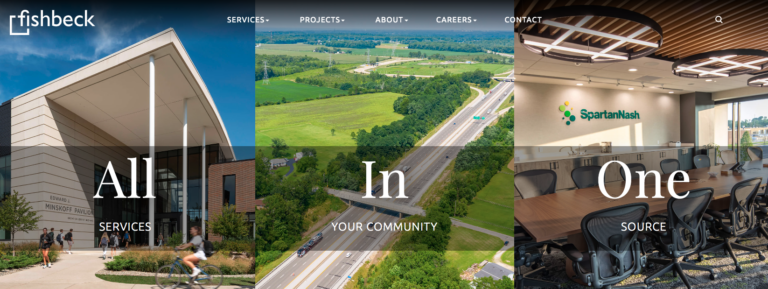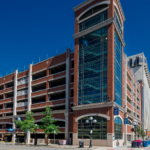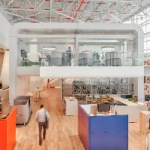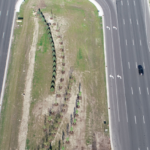
- Kim Kisner
- Business
- 11/21/2023
Lillian Woolley Talks to SBN Detroit About the Firm’s Work, Evolution

Fishbeck is a 67-year-old consulting firm focused on engineering, environmental sciences, architecture, and construction management with ten offices in Michigan, four in Ohio, and one in Indiana.
We spoke to Senior Engineer Lillian Woolley about the company’s internal sustainability practices, as well as their clients.
Q: What would you like us to know about Fishbeck?
A: Our goal is to provide all-in-one solutions to clients and to do that, we have many technical professionals completing a wide variety of work. Our technical staff has worked on some great projects for clients to support client sustainability initiatives, and I think that many Fishbeck employees enjoy those types of projects the most.
Our technical teams like the challenge of pulling off a project that is considered a “win-win,” and we often get the opportunity to do that. One of my favorite projects that we facilitated was the construction of a solar garden on a brownfield site in Cadillac, Michigan.
Q: Has Fishbeck always had a focus on sustainability?
A: Fishbeck started as a civil engineering firm that worked on water and wastewater treatment system projects more than 67 years ago. Over the years, different disciplines have been added, including environmental engineering, but there has always been a strong focus on helping preserve and enhance the natural resources around us. Fishbeck employees are active in several organizations like the 2030 Districts, U.S. Green Building Council, and more.
Q: Do you have an internal sustainability team?

A: We have a Sustainability Committee comprising representatives from most departments. Beyond the work we do for our clients, the Sustainability Committee considers firm-specific sustainability issues from an employee’s point of view, as well as from the point of view of the general public.
The committee has recently released a survey inside the firm to gauge interest and benchmark sustainability efforts. Using that data, they will present a plan for becoming an even more sustainable organization.
Your website says Fishbeck’s core purpose is to help people realize their visions while benefiting society. Can you tell us more about that?
A: Most Fishbeck employees want to work on technically challenging projects that leave the world – or their client – in a better place after the project is finished. For example, Fishbeck is working with the Kent County Department of Public Works on its Kent County Sustainable Business Park. Kent County has an ambitious goal to “Reimagine Trash” and to divert 90% or more of its trash from the landfill before 2030.
The new sustainable business park will include facilities to recycle solid waste. Our civil engineers designed the site work and utilities, while others designed the stormwater management system. Our environmental team is working on the wetlands permit and other environmental permits. Who wouldn’t love to work on a project so promising?
Q: Fishbeck achieved a Wildlife Habitat Council (WHC) Conservation Certification for its office headquarters in Grand Rapids. Tell us about this.
A: Fishbeck’s Grand Rapids Office is truly beautiful and includes more than 6 acres of wetlands. There is a large pond and, depending on the time of year, you can see all kinds of birds and other wildlife!
To become certified and to document our commitment to being good environmental stewards, Fishbeck ecological professionals surveyed the site, outlined a baseline inventory, and then implemented a plan to enhance the habitat. We recently had a Girl Scout troop come to our office to make bat houses, which we will install at the site.
Q: What are examples of your internal sustainability initiatives and goals?
A: Not only do our architects work with clients on LEED certification, but the Grand Rapids office buildings and landscape management are certified by the Leadership in Energy and Environmental Design (LEED) rating system. As part of its LEED certification, Fishbeck implements best management practices to benefit adjacent ecosystems.

Our Facilities Department unveiled a new recycling program earlier this year, including a compost program. They are also reviewing the downstream impact of our programs and processes.
The company has a hybrid work policy so employees can work from home. We are each given 8 hours of volunteer time to use during work hours during the year.
Our 17 office buildings have smart systems that turn off lights and lower heat when employees are not in the office.
Q: What are some examples of client work that involve sustainability in Southeast Michigan?
A: Fishbeck has worked with clients in Southeast Michigan on stormwater management projects, others on boiler or HVAC systems to reduce energy consumption, as well as work on a potential recycling facility. A few years back, we were doing a lot of energy assessments, and we are excited to be doing projects now identified in those assessments.
Q: How important is choosing partners and suppliers that also have a sustainability focus?
A: Scope 3 greenhouse gas emissions can be much higher than Scope 1 and 2 emissions, so paying attention to partners and suppliers is important. I encourage my clients to have a good understanding of their carbon footprint to ensure that when making changes they are moving in the right direction. It is fairly easy to switch suppliers and double your footprint if you are not careful.
Q: What are your biggest challenges when it comes to sustainability?
A: Communications. In many cases, the most sustainable approach may be cost-effective, but it takes time and effort to make those projects happen. You need to be knowledgeable about available grants and rebates.
You need to understand all options available, and you need to be able to communicate the benefits to all affected stakeholders. We make an effort to ensure we look at every option as well as advise our clients on making the best decision for the environment.
Q: What are the biggest opportunities?
A: The biggest opportunities are available in performing energy assessments and ensuring your facility is operating at its most efficient. This is because both utilities in Southeast Michigan offer rebates and similar programs allowing you to make changes and save money too.
There are also federal and state programs to encourage the installation of EV chargers, solar panels, weatherization, and other programs designed to lower greenhouse gas emissions. These programs probably won’t last forever, so it is good to take advantage of them while you can.

Q: What role do you think businesses play in sustainability?
A: The State of Michigan, through the MiHealthy Climate Plan, has committed to carbon neutrality by 2050. Through the MiHealthy Climate Plan, everyone in Michigan has committed to meeting this important goal.
Businesses can lead the way in demonstrating how we can all reduce our carbon footprint.
Companies like Fishbeck, with multiple offices in multiple states, should be setting an example to minimize our impact on the natural world. The type of work we do allows us to help others also become more sustainable through design integrity, technical knowledge, and inherent concern for the environment.
Be sure to subscribe to our newsletter for regular updates on sustainable business practices in and around Detroit.
Kim Kisner
- All
- Business
- Community
- Education
- Events

Floyd, founded in Detroit in 2013, is a furniture company focused on creating modular, long-lasting pieces designed to reduce waste and rethink traditional home furnishings. Known for its clean, adaptable designs and commitment to sustainability, Floyd has grown from a single product to a full line of beds, sofas, tables, and storage solutions—all centered around durability and ease of assembly. SBN Detroit interviewed co-founder Kyle Hoff about how...

ZF Group, a global technology company with its North American headquarters in Northville, specializes in systems for passenger cars, commercial vehicles, and industrial technology. With a focus on next-generation mobility, the company develops solutions that address electrification, automation, and digitalization while aiming to improve safety, efficiency, and sustainability in transportation. SBN Detroit interviewed Anuj Shah, Sustainability Lead, for the Americas, to explore the most pressing environmental challenges in...

The Chip Bag Project, based in Detroit, is a sustainability initiative that upcycles hard-to-recycle snack packaging — particularly chip bags — into insulated sleeping bags for individuals experiencing homelessness. Founded by Eradajere Oleita, the project addresses both environmental waste and housing insecurity by transforming materials like Mylar into practical, thermally efficient solutions. In June, Oleita was among Trelllis’s 30 Under 30, its annual recognition of the brightest young...







